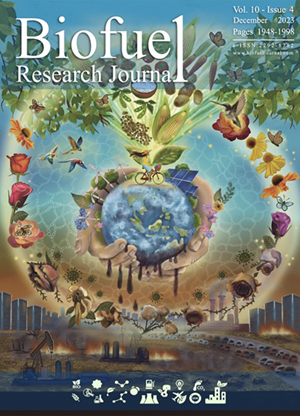An integrated approach to explore UASB reactors for energy recycling in pulp and paper industry: a case study in Brazil
IF 14.4
Q1 ENERGY & FUELS
引用次数: 12
Abstract
Brazil is currently focused on its energy matrix transition in favor of increasing of the share of renewable energy carriers for both enhanced energy security and mitigation of greenhouse gas emissions. In this context, the country`s pulp and paper industry whose different wastes teams are not generally exploited, could play a critical role. Accordingly, the main objective of this work is to develop a conceptual ‘systemic’ biorefinery framework integrating the treatment of pulp and paper mill wastewater using upflow anaerobic sludge blanket (UASB) reactor with energy recovery through biogas production and its conversion into heat and power in stationary engines and boilers, respectively. Based on the results obtained through the present case study, it was revealed that the adoption of UASB reactors by the paper mill industry could properly addresses the environmental concerns faced while could contribute to the national agenda favoring an increasing share of renewable energies in the country`s energy matrix. The financial analysis showed that the investment required for the implementation of UASB reactors within a biorefinery platform would be minor vs. the investment in the whole mill and would be returned in 6.4 yr with a high return on investment even when operated at half of operational capacity. Moreover, through the developed UASB reactor-based biorefinery, the Brazilian pulp and paper industry as a whole could avoid 1.06 ×105 CO2eq tons, effectively contributing to the decarbonization of the country`s economy.探索UASB反应器用于制浆造纸工业能源回收的综合方法:以巴西为例
巴西目前正专注于其能源矩阵转型,支持增加可再生能源载体的份额,以加强能源安全和减少温室气体排放。在这种情况下,该国的纸浆和造纸行业可以发挥关键作用,因为其不同的废物团队通常不会被开发。因此,这项工作的主要目标是开发一个概念性的“系统”生物精炼框架,将使用上流式厌氧污泥床(UASB)反应器处理纸浆和造纸厂废水与通过沼气生产及其在固定发动机和锅炉中转化为热和电能的能量回收相结合。根据本案例研究的结果,造纸工业采用UASB反应器可以适当解决所面临的环境问题,同时有助于推动国家议程,使可再生能源在国家能源矩阵中的份额不断增加。财务分析表明,在生物精炼平台内实施UASB反应器所需的投资与对整个工厂的投资相比将是微不足道的,并且即使在以一半的运营能力运营的情况下,也将在6.4年内获得高投资回报。此外,通过开发的基于UASB反应器的生物精炼厂,巴西纸浆和造纸工业作为一个整体可以避免1.06×105二氧化碳当量吨,有效地促进了该国经济的脱碳。
本文章由计算机程序翻译,如有差异,请以英文原文为准。
求助全文
约1分钟内获得全文
求助全文
来源期刊

Biofuel Research Journal-BRJ
ENERGY & FUELS-
CiteScore
22.10
自引率
1.50%
发文量
15
审稿时长
8 weeks
期刊介绍:
Biofuel Research Journal (BRJ) is a leading, peer-reviewed academic journal that focuses on high-quality research in the field of biofuels, bioproducts, and biomass-derived materials and technologies. The journal's primary goal is to contribute to the advancement of knowledge and understanding in the areas of sustainable energy solutions, environmental protection, and the circular economy. BRJ accepts various types of articles, including original research papers, review papers, case studies, short communications, and hypotheses. The specific areas covered by the journal include Biofuels and Bioproducts, Biomass Valorization, Biomass-Derived Materials for Energy and Storage Systems, Techno-Economic and Environmental Assessments, Climate Change and Sustainability, and Biofuels and Bioproducts in Circular Economy, among others. BRJ actively encourages interdisciplinary collaborations among researchers, engineers, scientists, policymakers, and industry experts to facilitate the adoption of sustainable energy solutions and promote a greener future. The journal maintains rigorous standards of peer review and editorial integrity to ensure that only impactful and high-quality research is published. Currently, BRJ is indexed by several prominent databases such as Web of Science, CAS Databases, Directory of Open Access Journals, Scimago Journal Rank, Scopus, Google Scholar, Elektronische Zeitschriftenbibliothek EZB, et al.
 求助内容:
求助内容: 应助结果提醒方式:
应助结果提醒方式:


